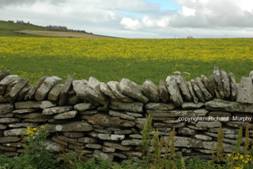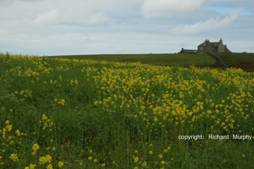Bio Fool - Teacher Notes
Bio Fool
Most diesel car engines will run on a mixture of 20% biofuel and 80% diesel.
Rudolph says 'If we grow rapeseed on 'set aside' land in the UK, we will be able to provide 20% of all the diesel used for road transport'.
Explain to Rudolph why his idea won't work!
Bio Fool - Teacher Notes
Introduction
Bio Fool is suitable for use AFTER earlier tasks that guide the students towards a solution (such as Stop Thief)have been tried.
This PE task requires pupils to identify the information they need in a sea of facts that all seem to be relevant.
The point of the Bio Fool tasks is to help pupils get a feeling for the scale of energy consumption, and the implausibility of some of the suggested solutions. Bio fuels can make a useful contribution to long term energy needs, but can't solve the problem.
Editing the Task
A variant of this task is for you to hold all the information, and to give pupils information as they ask for it. The virtue of this variant is that you can guide weaker pupils away from too much busy work (and you can save paper); the disadvantage is that pupils are not doing an authentic PE task all on their own.
Class Organisation
We recommend that pupils work in groups of 3 or 4.
Lesson Activities
A: Introduce the task. The powerpoint display can be used.
Biofuel is fuel which has been made from living things or their by-products. Examples are cow-dung, peanuts and other crops such as rapeseed - which produces oil. In the UK, the main biofuel crops will probably be rapeseed, wheat and sugar beet.
The EU used to produce far more food than we needed, or could export. Farmers are now paid NOT to grow things. The land they don't grow things on is called 'Set aside' land.
Rapeseed is a popular crop - pupils might not know that this is what is growing in those bright yellow fields.




B: Group work.
Encourage the pupils to tackle the whole task by themselves. Ask open questions ('how are you tackling this problem? What have you tried so far? What are you doing now? How does this fit with your overall plan?') and try not to be directive.
Encourage pupils to keep a record of the ways they have tried to tackle the problem.
C: Review Session
Ask groups to report back on the data they used, and on the methods they used, an on their solutions.
Ask how pupils broke the task up.
What assumptions did they make?
Is the reasoning sensible, and are the explanations clear?
How similar are the answers from different groups?
Solution
A year is a sensible unit for analysis, because:
- Diesel consumption is given for a whole year
- We can expect just one crop of seeds, in the UK
Using Set Aside land
There are 650,000 hectares of 'set aside' land; each hectare will produce about 3 tonnes of biofuel, so the total production could be about 1.95 million tonnes - say 2 million tonnes.
Annual consumption of diesel is 19.44 million tonnes - say 20 million tonnes. We are aiming to supply 20% of this from biofuel, so we need about 4 million tonnes.
The demand is therefore about twice the capacity that can be produced.
The actual government (and EU) target is 5% from Biofuel - which IS attainable.
Using Agricultural land
We need to produce about 4 million tonnes of biofuel. At 3 tonnes per hectare, this corresponds to 1.33 million hectares.
We have about 4.6 million hectares of agricultural land, so the proportion of agricultural land needed is about 1.3/4.6 - around 25%-30%.
Discussion about the PE
The estimated yield of 3 tonnes per hectare will depend on the weather, soil conditions, and the like (as the Table shows).
Accuracy and rounding: here, we have produced a 'paper and pencil' solution, rounding numbers at every stage.
Some students could use calculators or spreadsheets to produce accurate answers, and defer the rounding to the final stage.
Discussion could compare the differences in the answers produced.
An advantage of a spreadsheet solution is that different estimates (say of the yield from rapeseed in different years) can be used to illustrate the sensitivity of different solutions to different assumptions.
Discussion on Biofuel
The carbon in biofuel comes from the air - so it is recycled - unlike fossil fuels that release carbon that is trapped in oil into the air.
Henry Ford's Model T engines were designed to run on ethanol - a biofuel. Rudolph Diesel's engines were designed to run on peanut oil. 'Rock oil' came later, and was much cheaper.
Set aside land has been very good for wildlife.
In oilseed rape biodiesel production, approximately half the crop is retained as high protein animal feed.
Biofuel co-product can also be used to supply biomass for heat and power production, so helping to reduce carbon emissions further.
There is on-going research to increase the biofuel yield from crops.
Different crops produce different amounts of CO2 and other pollutants when burned. They need different amounts of fertilizer.
A mixture of crops will provide better farming conditions in the long term.
There are issues around the idea of using foodstuffs for fuel. A large proportion of the world's population live on small amounts of money.
Food prices are rising quickly (in 2007, farming conditions such as the Australian drought caused particular problems). Contributing factors are the increasing wealth in China and India increasing the demand for food, and for meat in particular (meat production is heavy on crops), and the demand for biofuels. If world food prices rise because of a demand in the West to 'save the planet' by using biofuels generated from food crops, the consequences for poor nations could be awful.
This is one reason why biofuels associated with grasses are being explored - humans can't eat them, and they can grow on land that is unsuitable for crops.
Current estimates suggest that there is about 300,000 tonnes of waste cooking oil and tallow that could be used for biofuel.
Resources
Wikipedia is a useful resource for information on Biofuels and Measurements
Some useful references:
http://news.bbc.co.uk/1/hi/scotland/4409369.stm
Green biodiesel production starts
http://news.bbc.co.uk/1/hi/sci/tech/5353118.stm
Biofuels look to the next generation
http://www.esru.strath.ac.uk/EandE/Web_sites/0203/biofuels/quant_production.htm
Quantitative UK Biofuel Production
http://news.bbc.co.uk/1/hi/scotland/4409369.stm
Green biodiesel production starts
http://news.bbc.co.uk/1/hi/sci/tech/5353118.stm
Biofuels look to the next generation
http://www.esru.strath.ac.uk/EandE/Web_sites/0203/biofuels/quant_production.htm
Quantitative UK Biofuel Production
http://www.nfuonline.com/x9763.xml
National farmers' union information